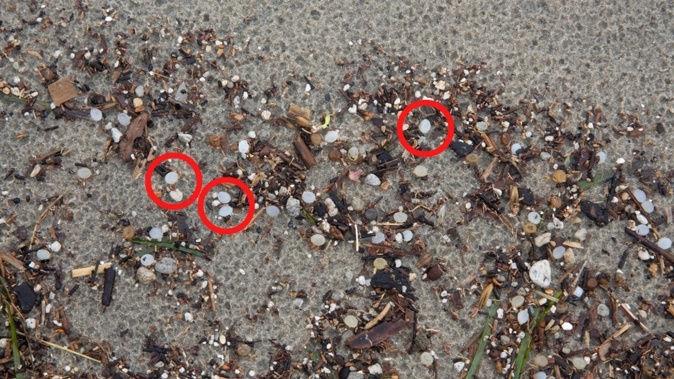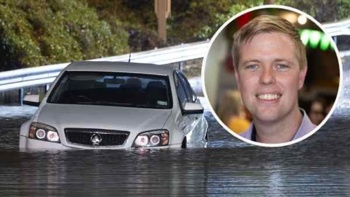
Plastic beads, bread bags and lollipop sticks are just some of the “millions of pieces” of microplastics that have washed up on Waihī Beach after Cyclone Hale hit the region last week.
Sustainable Waihī Beach co-founder Pippa Coombes said an “urgent beach clean” would be taking place tomorrow at 9.30am at Waihī Beach to pick up the microplastics.
“We need to get it off the beach because, obviously, the marine and bird life is going to be suffering terribly, and we’ve had [a] catastrophic few weeks with dead birds […] being washed up onto the beach.
“I think the urgency with this is, we do not want [these] microplastic[s] going back into the sea.”
Coombes said all were welcome to the “full beach clean”, and the Waihī Beach Surf Lifesaving Club would be doing a sausage sizzle and offering free coffee to those who helped.
“When you start looking closely, there are millions of pieces of microplastics... I’ve never seen anything like this hit the beach before. It’s an eye-opener.”
/cloudfront-ap-southeast-2.images.arcpublishing.com/nzme/ZACW3JZXY5CP7FL4TWEXKVOT5E.png) The "urgent" beach clean-up will take place tomorrow from 9.30am at Waihī Beach. Photo / Stuart Atwood
The "urgent" beach clean-up will take place tomorrow from 9.30am at Waihī Beach. Photo / Stuart Atwood
Coombes said the beach would be split into areas based on risk from the microplastic waste for the clean-up, and volunteers would be given “really big sieves” to sieve out microplastics from the sand
“Please take half an hour [or] an hour out of your day to come and help with the beach clean - help save marine life, bird life here, and save our precious taonga.”
Coombes said Sustainable Coastlines was coming from Auckland and would be cordoning off an area to study the plastics that have washed up.
- Cyclone recovery likely to be slow, farmers at 'wits’ end'
- Raging seas threaten to take historic Coromandel boating club
- Live: Cyclone Hale heads south; House buried by storm debris; locals fight to save boat club
- Cyclone warning: First tropical storm set to swipe North Island
- Lights out: Cyclone Hale knocks down 100-year-old tree in west Auckland, residents without power
“We’ve got an amazing beach here... help with our cause and Sustainable Coastlines’ to get some really good data on what’s actually washed up on the beach, so we can look further at funding and getting things put in place.”
Coombes believed some of the microplastics were Rena nurdles (plastic resin pellets), and others were microplastics from general human consumption.
“You’ve got things from Chupa Chup lollipop sticks to bread bags; just absolutely every type of plastic you can imagine, we’ve come across.”
However, a spokesman for the Astrolabe Community Trust said plastic beads could not be attributed to the Rena.
The trust was a group set up by Rena’s owner, Daina Shipping Company, and insurer The Swedish Club.
“We can’t, hand-on-heart, say, ‘Hey, look, that’s a Rena bead’, because sadly, they’re popping up [on] beaches around New Zealand.”
The spokesman said it had a system in place to respond to where beads were sighted in order to do a clean-up.
“When these big storm events come along, they wash away part of the dunes and they unearth some of the plastic beads that were lost during the clean-up salvage operation.
“And so, we work with community groups along those areas and just support a clean-up response and pick them out where we can after storm events, and that’s just again what’s happened here.”
The spokesman said the trust was involved in tomorrow’s beach clean-up and had been working with the Waihī Beach Surf Lifesaving Club.
/cloudfront-ap-southeast-2.images.arcpublishing.com/nzme/OHZAY4SRG5DQLMF4G2WKTTL7SI.jpg) Rubbish collected from a 30-minute litter pick outside the Waihī Beach surf lifesaving club. Photo / Stuart Atwood
Rubbish collected from a 30-minute litter pick outside the Waihī Beach surf lifesaving club. Photo / Stuart Atwood
Eastern region lifesaving manager Chaz Gibbons-Campbell said it was a “great initiative for people to get behind”.
“It’s looking after our favourite playground,” he said.
“Many hands make light work as well, so it would be great to see as many people down there as we can, really.”
Gibbons-Campbell said the Waihī Beach Surf Lifesaving Club had been running a beach clean-up initiative on the weekend, where the first 60 people to bring a cup of microplastics to the surf club would get a free drink.
“So, hopefully we’ll get it all cleaned up pretty quick-smart.”
A Western Bay of Plenty District Council spokesman said a lot of microplastics, including plastic beads, as well as seagrass and debris had washed up during Cyclone Hale.
Take your Radio, Podcasts and Music with you









